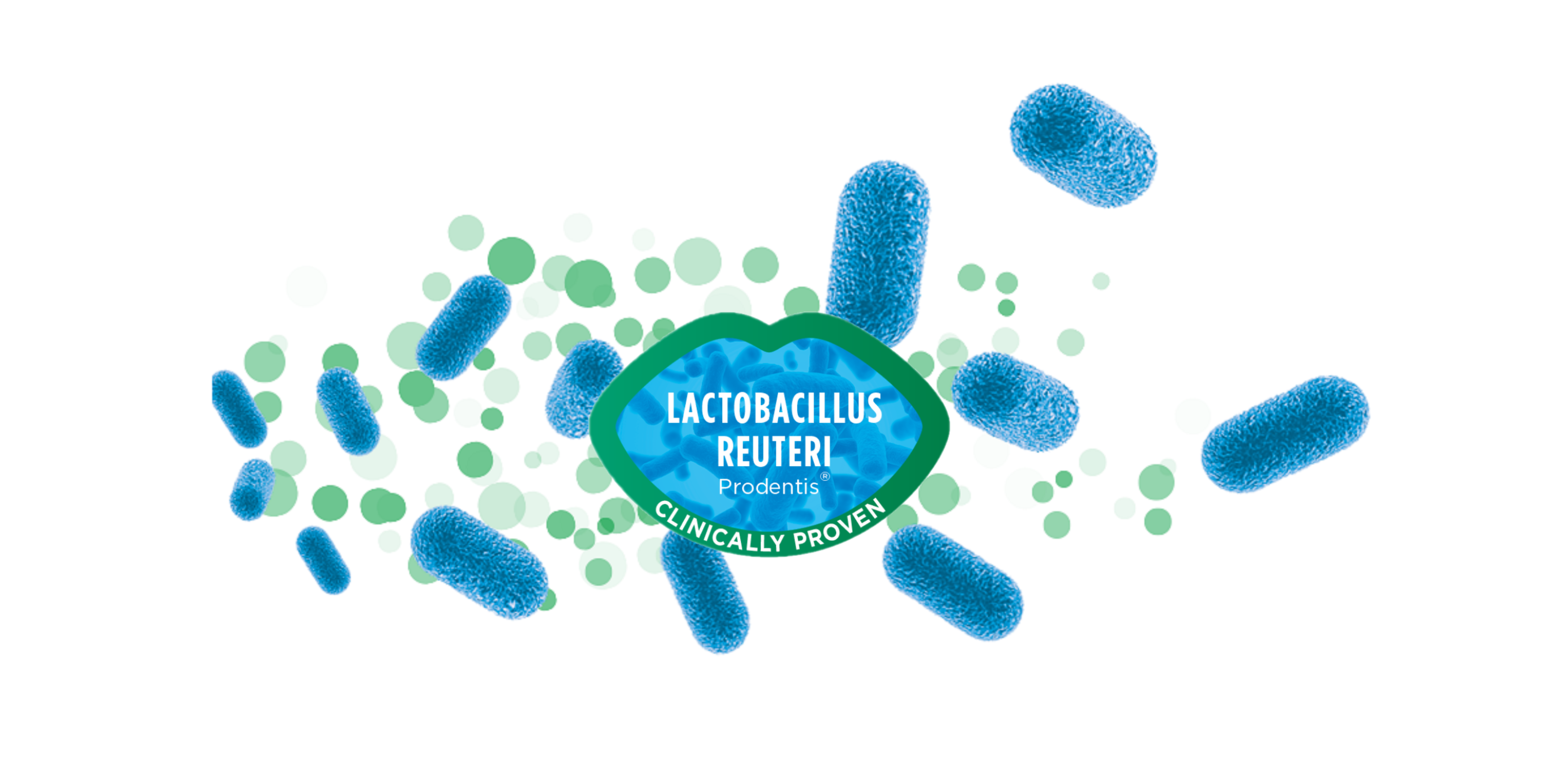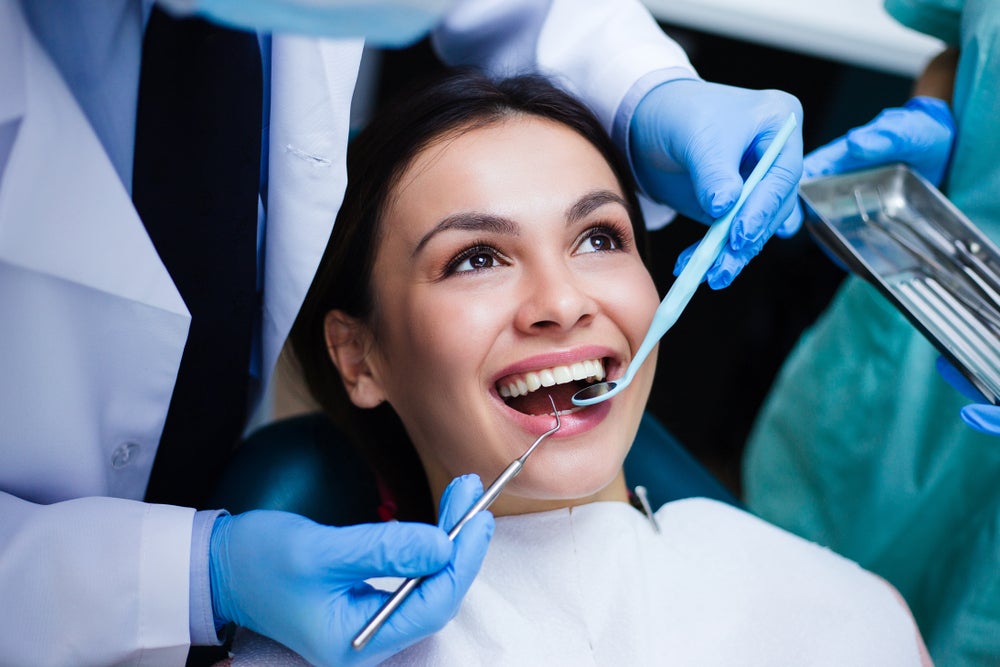
The Effect of Probiotics for Oral Health
The health benefits of probiotics have been extensively documented in many studies.

In the area of oral health, probiotics work by creating a biofilm that protects oral tissues against the action of periodontal pathogenic bacteria. They decrease the pH of the oral cavity making it more difficult for plaque bacteria to form dental plaque and calculus that cause periodontal disease.
Despite numerous papers published on the use of probiotics in the treatment of periodontitis, their use in dentistry is still in its infancy [1], [2], [3].
The latest clinical evidence however, clearly indicates that the probiotic Lactobacillus reuteri Prodentis supports the health of gums and teeth, and that it acts as an effective adjunct in the treatment of inflammatory periodontal disease.
Compelling trials results in periodontitis patients
The latest randomised controlled studies on the clinical and microbiological effects of Lactobacillus reuteri probiotics in the treatment of chronic periodontitis are compelling and indicate there is room for their increased uptake.
Recent studies by Teughels et al. [3] and Vicario et al. [2] show that the use of probiotics containing Lactobacillus reuteri Prodentis causes a significant decrease in plaque accumulation, significantly reduced gingival inflammation and significantly reduces pocket depths.
In a randomized placebo-controlled study, Teughels et al. demonstrated that taking probiotics containing Lactobacillus reuteri Prodentis as an adjunct therapy in scaling and root planing significantly improves the clinical parameters "reduction of probing depth", "bleeding index" (BoP) and "plaque index" (PBI). Vicario et al. clearly confirmed these findings in their double-blind study.
Segerer et al. [4] report that three months use of probiotics containing Lactobacillus reuteri Prodentis was associated with a significant reduction in the gingival index, the papilla bleeding index, the plaque index and colonization with streptococcus mutans compared to the placebo group. Further studies show a significant decrease in proinflammatory cytokines in the sulcus fluid and a growth-inhibiting effect on streptococci.
Mode of action of probiotics containing Lactobacillus reuteri Prodentis in the oral cavity
Lactobacillus reuteri Prodentis acts on the oral microflora, competing with pathogenic bacteria for binding sites and nutrients. Lactobacillus reuteri Prodentis also produces an organic compound know as reuterin, which directly inhibits the growth of pathogenic bacteria.
Lactobacillus reuteri Prodentis not only suppresses the formation of endogenous pathogens and prevents superinfection with exogenous pathogens, it also stimulates the immune system. From a therapeutic perspective, it is important that probiotics are taken daily, because Lactobacillus reuteri Prodentis does not permanently colonise the oral cavity or the digestive tract.
Target group
The primary target groups for the use of probiotics containing Lactobacillus reuteri Prodentis are patients with oral hygiene challenges.
Probiotics containing Lactobacillus reuteri Prodentis are indicated in periodontitis patients as anti-infective therapy and as periodontal maintenance therapy post intervention.
Their use is also indicated in pregnant women, smokers and patients at high risk of dental caries.
Probiotics containing Lactobacillus reuteri Prodentis administration may also be an alternative to the long-term use of chlorhexidine.
Finally use of oral probiotics is also recommended in people who are unable to properly care for their oral health, such as the physically/mentally impaired or the bedridden.
About probiotics
The word probiotics literally translates as "for life" - unlike antibiotics, which means "against life". The World Health Organization defines probiotics as living microorganisms that, when administered in adequate amounts, have overall health benefits for the user.
Important criteria for qualification as a probiotic are therefore that the good bacteria are alive and their effect has been proven in clinical studies. In addition, a commercially available probiotic supplement or dental probiotic must contain the same bacterial strain (or strains) and the same dose used in the clinical trials, a requirement which is closely followed at Sunstar.
Before a microorganism can actually be used as a probiotic therefore, it must meet the prerequisite requirements of clinical safety, proof of a health benefit, intact passage of the gastrointestinal tract and technological suitability. Probiotic effects have been demonstrated for various strains of Lactobacillus that occur naturally in the gut. These include Lactobacillus reuteri, Lactobacillus rhamnosus, Lactobacillus acidophilus, Lactobacillus casei and Bifidobacterium lactis.
Probiotics are commercially available as an additive in food, as a dietary supplement or in the form of medicines. They have been used for several decades in the treatment of diarrhoea, gastrointestinal disorders or to stimulate the immune system, as well as in allergies. Adverse effects are considered rare.
[1] Laleman I, Yilmaz E, Ozcelik O, Haytac C, Pauwels M, Herrero ER, et al. The effect of a streptococci containing probiotic in periodontal therapy: A randomized controlled trial. J Clin Periodontol. 2015;42:1032–41.
[2] Vicario M, Santos A, Violant D, Nart J, Giner L “Clinical changes in periodontal subjects with the probiotic Lactobacillus reuteri Prodentis: a preliminary randomized clinical trial. Acta Odontol Scand. 2013 May-Jul; 71(3-4):813-9.
[3] Teughels W, Durukan A, Ozcelik O, Pauwels M, Quirynen M, Haytac MC “Clinical and microbiological effects of Lactobacillus reuteri probiotics in the treatment of chronic periodontitis: a randomized placebo-controlled study”. J Clin Periodontol. 2013 Nov; 40(11):1025-35.
[4] Segerer et al. Z Obstetrics Neonatol 2011; 215 - PO16_10.






